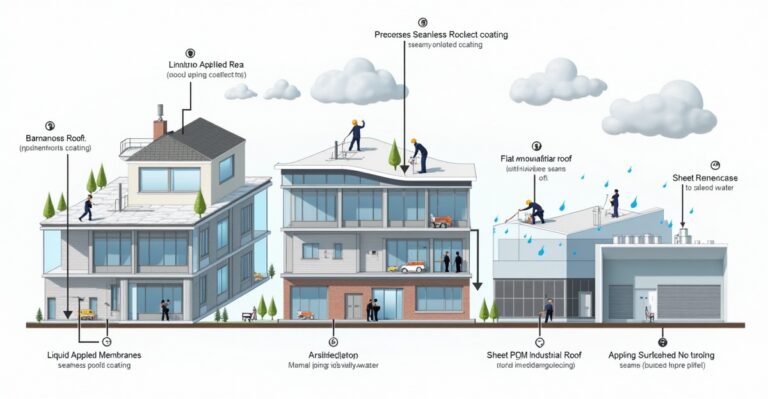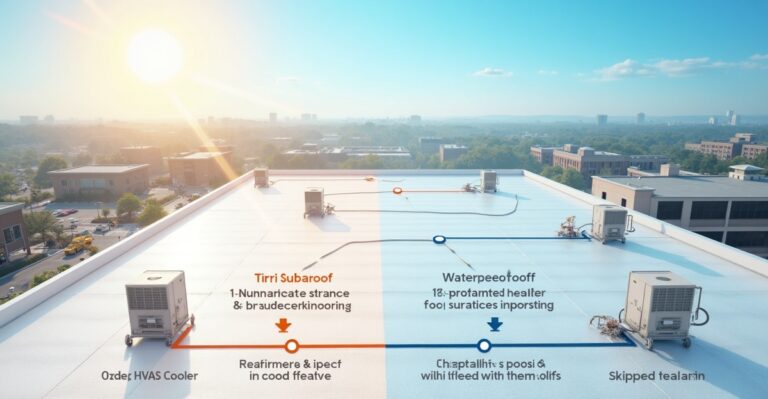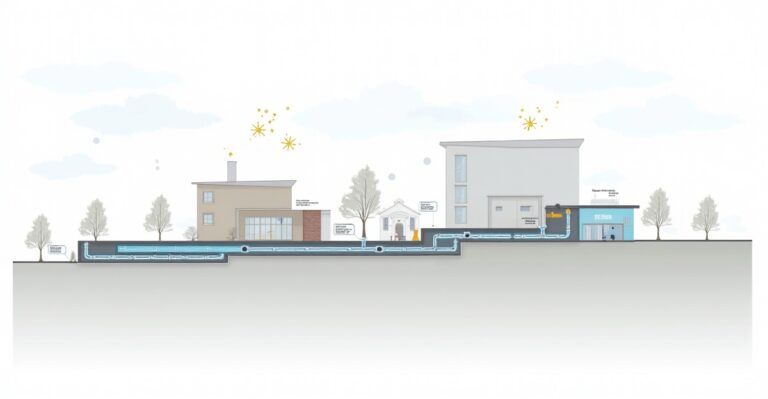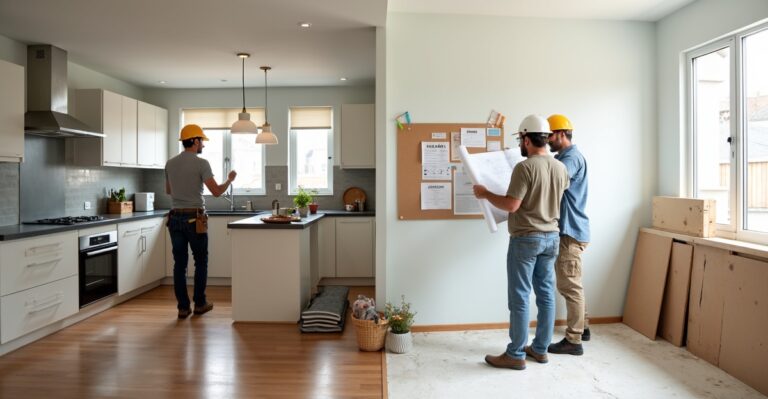How to Choose the Right Roofing Contractor
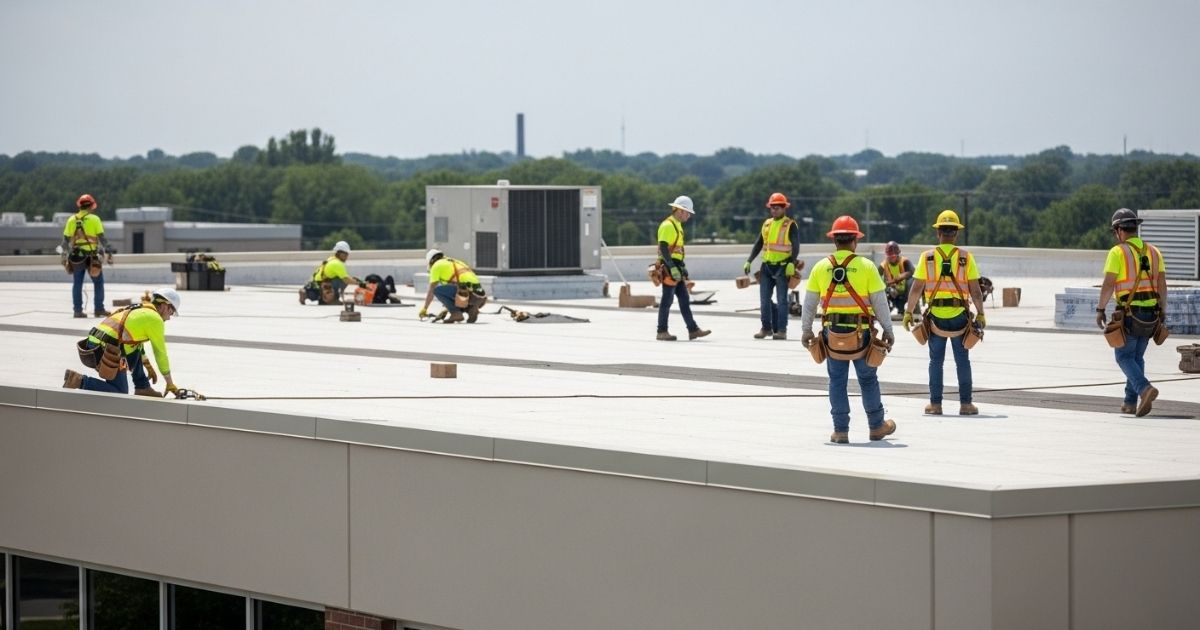
Hiring the right roofing contractor can feel overwhelming—especially when your property’s safety, value, and comfort are on the line. Whether you’re a homeowner or managing a portfolio of commercial buildings, choosing a roofing contractor you can trust is one of the most important decisions you’ll make.
In this guide, you’ll get straightforward advice on what to look for, what to ask, and what red flags to avoid—so you can make an informed choice with confidence.
Here’s what we’ll cover:
- Why Choosing the Right Roofing Contractor Matters
- Key Qualities of a Reliable Roofing Contractor
- What to Ask Before Hiring a Roofing Company
- Residential vs. Commercial Roofing Needs: What to Look For
- Red Flags That Signal an Untrustworthy Contractor
- Conclusion: Make a Confident, Informed Choice
Let’s start by looking at why this decision matters more than most property owners realize.
Why Choosing the Right Roofing Contractor Matters
When it comes to protecting your home or managing a commercial property, your roof isn’t something you can afford to gamble on. It’s the first line of defense against the elements—and a big-ticket investment. That’s why choosing the right roofing contractor isn’t just a task on your to-do list. It’s a decision that impacts everything from safety and energy efficiency to property value and peace of mind.
Common Mistakes and Frustrations to Avoid
We hear it all the time: “I’ve had bad contractors before—how do I find someone reliable?” If that sounds familiar, you’re not alone.
Many property owners fall into the same traps:
- Hiring the cheapest bid without understanding what’s included
- Trusting a contractor who won’t show proof of insurance or licensing
- Getting vague estimates that balloon mid-project
- Dealing with poor communication, messy job sites, or constant delays
Unfortunately, the cost of choosing the wrong roofer isn’t just money—it’s stress, disruption, and long-term headaches. A leak that isn’t fixed properly can lead to mold. Poor ventilation can spike your energy bills. And for commercial properties, a botched roofing job can mean compliance violations or upset tenants.
These aren’t just minor issues. They’re risks that affect your property’s function, appearance, and long-term value.
What’s at Stake for Residential and Commercial Properties
For homeowners, the stakes are deeply personal. A roof protects your family, your belongings, and your biggest financial investment. Cut corners here, and you could face water damage, lost insulation, or a drop in your home’s curb appeal and resale value. Not to mention the discomfort of dealing with recurring leaks or loud, drawn-out repairs.
For commercial property managers and business owners, the equation is even more complex. One missed detail can lead to major disruptions—costly downtime, compliance issues, or tenant complaints. And if you’re managing multiple sites, consistency across vendors becomes even more important. Choosing the wrong contractor can introduce coordination issues and unnecessary liability exposure that hurt your bottom line.
Whether you own a single home or oversee a dozen buildings across state lines, your roofing partner should be equipped to handle the job with transparency, efficiency, and zero surprises. This is about more than shingles or surface repairs—it’s about property protection during roofing projects, minimizing disruptions, and preserving long-term value.
Key takeaway: The right roofing contractor doesn’t just fix a problem—they help you avoid new ones. By steering clear of common pitfalls and understanding what’s at stake, you’re already on the path to making a smarter, safer decision.
Key Qualities of a Reliable Roofing Contractor
When you’re comparing roofing contractors, knowing what to look for can save you from costly mistakes—and unnecessary stress. The best roofing professionals don’t just show up with a ladder and a quote. They bring credentials, clarity, and confidence. Here’s what to check before signing any agreement.
Are They Licensed, Insured, and Certified?
Before anything else, ask: “Is my roofer licensed, insured, and certified?”
This isn’t a small detail—it’s your protection. A licensed contractor meets state or local requirements and is legally authorized to perform roofing work in your area. Insurance—especially general liability and workers’ compensation—ensures you’re not held responsible if an accident or damage occurs on your property, as explained in guidance on hiring licensed and insured contractors.
Certifications from manufacturers or third-party organizations are another layer of credibility, showing they’re trained and approved to install specific roofing systems properly.
Always ask for documentation. If a contractor hesitates or gives you vague answers, that’s a red flag. A reputable company will be glad to provide proof.
Do They Offer Transparent Quotes and Contracts?
A trustworthy contractor doesn’t dodge pricing questions or hand over a one-line quote. Instead, they walk you through the details—labor, materials, timeline, warranty, and payment terms—so you know exactly what to expect.
Look for cost transparency in roofing quotes and a clear, written contract before any work begins. If the estimate feels too good to be true, it probably is. Vague numbers often lead to surprise charges or cut corners. A reliable roofer will explain the full scope up front and answer your questions without pressure.
Do They Back Their Work with Strong Warranties?
Roofing isn’t just about the installation—it’s about standing behind the work. Quality contractors offer roofing warranties and certifications that protect you long after installation—covering defects in materials and workmanship. This includes both manufacturer warranties on materials and workmanship guarantees from the contractor themselves.
Ask:
- What’s covered?
- How long does it last?
- What voids the warranty?
A contractor that’s confident in their work will provide clear answers—and stand by them.
How Experienced Are They with Your Type of Property?
Not all roofs—or clients—are the same. Residential and commercial properties each come with unique challenges. So it’s important to ask whether the contractor has experience with your type of building.
For homeowners, that might mean navigating older roof structures or integrating energy-efficient roofing solutions.
For commercial clients, it could involve handling multi-site roofing contractor services, specialized systems like flat or metal roofs, or coordinating with building maintenance teams across several locations.
Ask about similar projects they’ve completed. A contractor who understands your property type will be able to plan proactively—and avoid costly delays or do-overs.
Can They Manage the Entire Project Smoothly?
From permitting to cleanup, a roofing project has a lot of moving parts. A reliable contractor doesn’t just show up to install shingles—they handle everything from start to finish.
This is where project management in roofing construction really matters. Look for signs that the contractor can:
- Stick to a schedule
- Communicate clearly
- Keep the job site safe and organized
- Coordinate crews and subcontractors effectively
You want a partner who respects your time, keeps you informed, and delivers what they promised—on time and on budget.
Checklist: 6 Things to Verify Before Hiring a Roofer
- Active license and valid insurance documents
- Detailed written quote with no vague line items
- Clear warranty terms for labor and materials
- Proven experience with your property type
- Strong communication and timeline management
- Positive reviews, references, and real project examples
Key takeaway: A reliable roofing contractor doesn’t just talk a good game—they prove it. From licenses to warranties to how they manage your job, the right provider gives you confidence at every step. Take the time to ask questions, verify credentials, and choose someone who treats your property like it matters—because it does.
How long will the roofing project take?”
Timelines matter—especially if you’re managing a business or have a family at home. A trustworthy contractor should give you a realistic estimate that accounts for weather delays, material lead times, and any inspection requirements.
For commercial properties, timing is even more critical. Will the crew work around your operating hours? Can they minimize disruptions to tenants or staff? Look for a company that understands how to plan around your daily operations and keeps you informed every step of the way.
“Can I get a clear quote before I commit?”
Always ask for a detailed, written quote. It should break down materials, labor, clean-up, and any possible add-ons. Be wary of vague estimates or low-ball bids that don’t reflect the full scope of the work. These often lead to hidden costs later on.
Clear estimates reflect cost transparency in roofing quotes and signal that the contractor values honesty as much as you do.
“Do you provide end-to-end project management?”
Roofing is more than installation—it’s coordination. A well-run project includes everything from permitting and safety protocols to clean-up and final walkthroughs. Ask if the contractor offers full-service roofing and general contracting, including project management in roofing construction.
Good project management reduces miscommunication, delays, and unnecessary site disruptions.
“Will this roofing job disrupt my business or tenants?”
If you manage a commercial property or multi-family unit, this is a critical question. The right contractor should have a plan in place to limit impact—whether that’s staging work in sections, scheduling during off-hours, or providing updates to tenants and staff.
For homeowners, the question might be: “How will this impact my day-to-day life?” A responsible roofer should walk you through the process, explain the noise levels and access points, and work with you to keep things as smooth as possible.
Bonus Questions That Show You’re Doing Your Homework
- “What does your roof inspection and damage assessment process look like?”
- “Can you provide references from similar projects?”
- “How do you handle roofing compliance and insurance documentation?”
- “Who will be my main point of contact during the project?”
Key takeaway: Asking smart questions doesn’t just help you compare bids—it reveals how the contractor communicates, how much they respect your time, and whether they’re equipped to handle your specific needs. Don’t just settle for a quote. Dig deeper. The answers will tell you everything you need to know.
What to Ask Before Hiring a Roofing Company
Even if a roofing contractor seems like the right fit on paper, the real test comes when you ask the right questions. A professional, reliable roofer won’t dodge tough conversations—they’ll welcome them. These questions aren’t just about gathering facts; they’re how you spot the difference between someone who’s prepared to handle your project and someone who’s not.
Here are key questions to ask before signing anything:
“How long will the roofing project take?”
Timelines matter—especially if you’re managing a business or have a family at home. A trustworthy contractor should give you a realistic estimate that accounts for weather delays, material lead times, and any inspection requirements.
For commercial properties, timing is even more critical. Will the crew work around your operating hours? Can they minimize disruptions to tenants or staff? Look for a company that understands how to plan around your daily operations and keeps you informed every step of the way.
“Can I get a clear quote before I commit?”
Always ask for a detailed, written quote. It should break down materials, labor, clean-up, and any possible add-ons. Be wary of vague estimates or low-ball bids that don’t reflect the full scope of the work. These often lead to hidden costs later on.
Clear estimates reflect cost transparency in roofing quotes and signal that the contractor values honesty as much as you do.
“Do you provide end-to-end project management?”
Roofing is more than installation—it’s coordination. A well-run project includes everything from permitting and safety protocols to clean-up and final walkthroughs. Ask if the contractor offers full-service roofing and general contracting, including project management in roofing construction.
Good project management reduces miscommunication, delays, and unnecessary site disruptions.
“Will this roofing job disrupt my business or tenants?”
If you manage a commercial property or multi-family unit, this is a critical question. The right contractor should have a plan in place to limit impact—whether that’s staging work in sections, scheduling during off-hours, or providing updates to tenants and staff.
For homeowners, the question might be: “How will this impact my day-to-day life?” A responsible roofer should walk you through the process, explain the noise levels and access points, and work with you to keep things as smooth as possible.
Bonus Questions That Show You’re Doing Your Homework
- “What does your roof inspection and damage assessment process look like?”
- “Can you provide references from similar projects?”
- “How do you handle roofing compliance and insurance documentation?”
- “Who will be my main point of contact during the project?”
Key takeaway: Asking smart questions doesn’t just help you compare bids—it reveals how the contractor communicates, how much they respect your time, and whether they’re equipped to handle your specific needs. Don’t just settle for a quote. Dig deeper. The answers will tell you everything you need to know.
Residential vs. Commercial Roofing Needs: What to Look For
Not all roofing projects are created equal—and neither are the people managing them. Whether you’re a homeowner or a commercial property manager, your priorities, risks, and expectations are different. Choosing a roofing contractor who understands those differences is key to a successful outcome.
What Homeowners Should Prioritize
Your home isn’t just a structure—it’s where your life happens. That’s why homeowners should focus on roofing solutions that protect their investment, improve comfort, and enhance the property’s look and efficiency.
Here’s what to look for:
- Energy-efficient roofing solutions that help lower monthly energy bills
- Durable materials that match your climate and style
- Financing options that make a quality roof more affordable
- Clear communication and a clean, respectful job site
- A team that shows up on time, keeps you in the loop, and finishes on schedule
If you’re searching for an affordable roofing contractor for homeowners, affordability shouldn’t mean cutting corners. It should mean honest pricing, flexible financing, and long-term value.
What Commercial Property Managers Should Prioritize
Managing a commercial building—or a portfolio of them—adds another layer of complexity. You’re juggling tenant expectations, budget constraints, operational uptime, and compliance regulations. Your roofing partner needs to deliver more than just solid work—they need to help you manage risk and reduce hassle.
Key things to prioritize:
- Storm restoration roofing services with a proven process for urgent repairs
- Experience with multi-site roofing contractor services for portfolio consistency
- Full documentation for roofing compliance and insurance requirements
- Minimal disruption to tenants, staff, or customers
- Reliable timelines and proactive project updates
- Strong warranties and maintenance plans that protect your assets
An insurance-approved roofing contractor with commercial experience knows how to work with adjusters, meet inspection codes, and keep projects moving without delay.
Visual Suggestion: Roofing Priorities at a Glance
| Priority | Homeowners | Commercial Property Managers |
| Energy Efficiency | ✅ Reduce bills with smart roofing materials | ✅ Meet green building standards |
| Project Disruption | ✅ Keep home safe, clean, and accessible | ✅ Minimize impact on tenants or operations |
| Budget Flexibility | ✅ Financing and honest pricing | ✅ Transparent costs for multiple stakeholders |
| Compliance & Documentation | ⚠️ Less critical but still important | ✅ Critical for permits, audits, insurance |
| Long-Term Maintenance | ✅ Warranties for peace of mind | ✅ Maintenance plans for asset preservation |
| Portfolio Management | ❌ N/A | ✅ Need consistency across properties |
Key takeaway: Whether you’re protecting your family home or managing commercial real estate, your roofing priorities should guide your contractor choice. Make sure they understand your goals, speak your language, and have real experience with projects like yours.
Red Flags That Signal an Untrustworthy Contractor
Even the most polished website or friendly sales pitch can mask a contractor who isn’t up to the job. That’s why it’s essential to look beyond appearances and pay attention to red flags that signal a lack of professionalism, transparency, or reliability. Here’s what to watch for before you commit.
No Written Estimate or Vague Scope of Work
If a contractor offers a quick quote without putting anything in writing—or provides a vague description like “roofing services – TBD”—that’s a warning sign. You need a detailed, written estimate that outlines exactly what’s included: materials, labor, cleanup, timelines, and payment terms.
Why it matters: Vague estimates lead to misunderstandings, hidden fees, and corners cut. A reputable roofer will take the time to document everything clearly and review it with you line by line.
Lack of Licensing or Proof of Insurance
If a contractor can’t—or won’t—provide documentation showing they’re licensed and insured, walk away. These aren’t optional details; they’re your protection against liability and poor workmanship.
- Licensing ensures the roofer meets your state or local requirements
- Insurance protects you if someone gets injured or property gets damaged
- Certifications demonstrate training and product knowledge from manufacturers
Ask to see these documents. A professional contractor will have them ready and up to date.
High-Pressure Sales or Unrealistic Promises
Be cautious of anyone who tries to push you into signing a contract on the spot—or who guarantees things that sound too good to be true. Examples include:
- “We can do the whole roof in a day, no matter the size.”
- “We’ll beat any quote by 50%.”
- “This offer is only good today.”
A trustworthy roofer gives you time to review the proposal, ask questions, and make an informed decision—without pressure or gimmicks.
Poor Communication or No References
Communication is key to a smooth project. If a contractor is hard to reach, gives inconsistent answers, or avoids your questions, consider it a red flag. The same goes if they can’t—or won’t—provide references or project examples.
Ask for:
- A list of recent clients you can contact
- Photos of past residential or commercial roofing jobs
- Reviews on trusted platforms like Google or the BBB
Transparency builds trust. If it’s missing from the start, it won’t get better during the job.
🚩 Red Flags Checklist – Avoid These Contractor Pitfalls
- No written estimate or unclear project scope
- Cannot show valid license, insurance, or certifications
- Uses pressure tactics or “limited time” deals
- Makes promises that sound too good to be true
- Avoids questions or doesn’t provide references
- Poor communication before the job even starts
Key takeaway: A trustworthy roofing contractor wants you to feel confident—not confused or rushed. If something feels off, trust your gut and ask questions. The right partner will be open, clear, and respectful from the very first conversation.
Conclusion: Make a Confident, Informed Choice
Choosing the right roofing contractor is more than checking a few boxes—it’s about protecting your property, your investment, and your peace of mind. Whether you’re a homeowner looking for energy-efficient upgrades or a commercial property manager managing multiple sites, the stakes are high—and the right partner makes all the difference.
Let’s recap what you should look for:
- A contractor who is licensed, insured, and certified
- Transparent, detailed quotes with no surprises
- Strong warranties and long-term support
- Proven experience with your type of property
- Clear communication and end-to-end project management
- A track record of professionalism—not pressure
At RayPro Roofing & General Contracting, we’ve spent more than 17 years earning the trust of residential and commercial clients across 17 states. We believe in doing things right the first time—with honesty, reliability, and expert craftsmanship.
Schedule a roof inspection or request a transparent quote—no pressure, just honest answers. We’re here to help you make the right decision for your property and budget.
Frequently Asked Questions
Ask about licensing, insurance, warranties, and project timelines. A reliable contractor should provide a written estimate, explain their process, and offer references from past clients. Questions like, “Do you handle permits?” or “Who will oversee the job?” help you understand their project management approach.
Start with a detailed, written quote that breaks down all materials, labor, and potential extras. Ask if the quote includes cleanup, permits, and disposal fees. Clarify whether the price could change if unexpected issues are discovered during the job—and how those changes will be communicated.
They should be. Always ask for proof of licensing and insurance before any work begins. Licensing ensures they meet local requirements, and insurance protects you from liability if someone is injured or property is damaged during the project. If they can’t provide documents, that’s a red flag.
There will always be some level of disruption, but a professional contractor works to minimize it. Ask about work hours, access points, and how noise or debris will be managed. For commercial properties, confirm they can coordinate around business operations or tenant needs.
You should receive two types of warranties: one from the manufacturer covering materials, and another from the contractor covering workmanship. Ask how long each lasts, what’s covered, and what could void the warranty. A contractor who offers strong warranties is one who stands behind their work.

